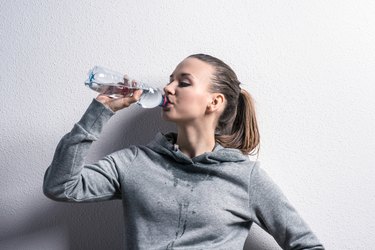
Cells are the basic unit of structure and function of life. A balance between fluids and electrolytes is necessary if cells are to survive and function normally. According to "Nursing Standard," approximately 60 percent of the human body is water, and body water contains electrolytes. It is the kidneys' job to control fluid and electrolytes. On a day-to-day basis, water intake should be balanced with water loss.
Fluid Balance
Video of the Day
Water for the body comes from both liquids and food. Water is lost mostly through urine, but also through evaporation from the skin when sweating, the respiratory tract and in feces. When water intake is high, the kidneys produce larger amounts of urine to help maintain a balance. When the body is losing water, the kidneys will try to conserve water by producing a small amount of concentrated urine.
Video of the Day
Electrolyte Significance
Electrolytes are charged particles in body fluids that help transmit electrical impulses for the proper functioning of the heart, nerves and muscles. The number of positively charged particles and negatively charged particles is supposed to be equal. An upset of this balance can result in life-threatening conditions.
Dehydration
Fluid balance can be disrupted by illness. Dehydration is a common side effect of illness that disrupts the balance of fluids and electrolytes. Patients can become dehydrated when their appetite is low and they don't eat enough food and drink enough fluids. As noted in "Nursing Standard," physical problems such as vomiting, bowel disorders or unconsciousness all prevent normal intake. Fever from infections and increased urine output from medications or diabetes can also cause dehydration. When dehydration occurs, the body will attempt to compensate by drawing water into the blood to maintain blood volume and blood pressure, while the kidneys will produce concentrated urine in an attempt to conserve water.
Over-Hydration
Over-hydration is an excess of body water. Over-hydration is commonly seen in patients with heart failure, kidney impairment and liver disease. When over-hydration occurs and the kidneys are not able to compensate, fluid will back up, affecting the heart and creating an imbalance of fluid and electrolytes in the body. When over-hydration happens, in some situations medications can be given to help increase urine production to fix the problem. If the kidneys fail completely, dialysis may be necessary.
Electrolye Imbalance
The primary electrolytes in the body are potassium, magnesium, calcium and phosphorus. According to "RN," too much or too little of any one of these can quickly become a major problem for the patient. The balance of electrolytes is regulated through a feedback system. If a particular electrolyte level is too high, the kidneys attempt to increase excretion or retain fluid as a compensatory mechanism to equalize. Extreme highs or lows of electrolytes can cause a constellation of complications which may include muscle weakness or paralysis, confusion, abnormal heart rhythms or cardiac arrest.
Is this an emergency? If you are experiencing serious medical symptoms, please see the National Library of Medicine’s list of signs you need emergency medical attention or call 911.